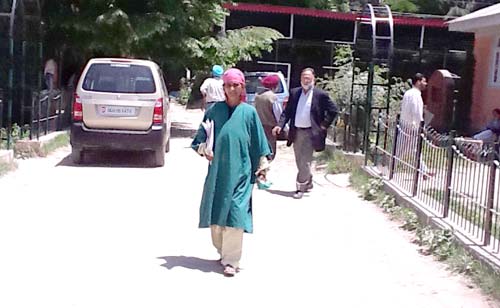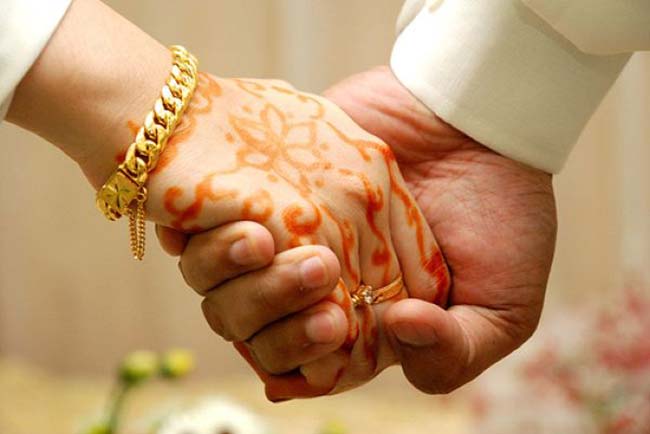Threatened by the government-backed gunmen to keep quiet, Bakhti Begum sold off her land to keep up the fight for her son who became a victim of enforced disappearances in Kashmir valley in 2002. Her flailing struggle to bring the perpetrators to justice took her to Geneva is far from over, Shah Abbas reports.
(Waiting for justice: Since 2002, Bakhti has been doing rounds of police stations and court rooms to hear any news of her missing son.)
It was a bright Friday afternoon at the normally overcrowded district court complex in Baramulla. Lawyers in black overalls were hurrying with their assistants from their chambers to courtrooms and back. Outside the courtrooms, anxious people waiting for their cases to be heard indulged in idle conversations to kill time. At the main gate, two J&K police personnel frisked the visitors.
Abdul Qayoom Tantray, a bearded, handcuffed man escorted by a posse of J&K police personnel arrived at the court. Qayoom is not an ordinary prisoner. Accused of being involved in the disappearance of a youth in north Kashmir, the charge-sheet filed by J&K police against him describes him as ‘an icon of terror’, “Everybody was afraid of him. Qayoom, a surrendered militant, had the patronage of Army,” the charge-sheet reads.
As Qayoom was being taken to the courtroom, a frail-looking woman wearing a maroon-coloured pheran who was following the escort lifted her arms towards the sky and began cursing Qayoom. The sight of a cursing woman inside the court complex left Qayoom visibly unmoved and he entered the courtroom without looking back.
The woman in question was sixty five year old Bakhti Begum, probably the only woman in Kashmir who has been given round-the-clock protection by the state on the orders of J&K High Court. Bakhti is one of the many women whose sons have been subjected to enforced disappearance in the state over the last 24 years of armed conflict.
Hailing from Trakepora village in north Kashmir, Bakhti, a widow, appears frail and broken. But her determination to trace her son has given her strength to keep the flame within her burning. Bakhti visits the district court in Baramulla every time Qayoom is brought for trial. Qayoom is accused of kidnapping and subjecting Bakhti’s son to enforced disappearance with the help of an Indian Army major of 28 RR in December 2002. The chargsheet filed by J&K police suggests that Bakhti’s son, Manzoor Ahmad Wani, was murdered in custody.
Bakhti says she vividly remembers the day when her son was abducted, “Manzoor’s wife, Jabeena, was ill. We were heading to Baramulla from Rohama as my son lived with his in-laws. Our bus was stopped near Trakepora Army camp for search operation. It was the order of the day,” recalls Bakhti Begum.
“Two Ikhwani’s (government backed gunmen) including Qayoom got into the bus and started search operation. When they finished, they took away Manzoor with them and went to Major S Bhattacharya of 28 Rashtrya Rifles (RR), then in-charge of Trakepora camp who was standing near the bus. Army major and Qayoom took my son inside the camp and that was it. He never returned after that,” Bakhti recalls.
There was very little that Bakhti could do to save her son. Left with no option, Bakhti spent three days from dawn to dusk outside the RR camp where her son was taken by Qayoom and major Battacharya. She met some village elders to seek their help. They suggested her to inform police. “But Qayoom Ikhwani threatened me of dire consequences in case I were to inform the police,” Bakhti says.
Qayoom’s threats didn’t stop a desperate mother. She approached the then Superintendent of Police (SP), Sopore, who directed the concerned police station to lodge a complaint. “I still remember that some Abbas sahib was the SP Sopore at that time,” Bakhti says. The FIR was lodged in December 2002 but till 2006, nobody ever questioned the accused. “Had police taken quick action, my son would have not gone missing in custody,” Bakhti rues.
(Bakhti at district court complex Baramulla.)
Finally after a week, Bakhti was told by the Army that her son was released two days ago and Qayoom had taken him to an undisclosed destination. “I started making rounds of police station and the residences of police officers,” Bakhti recalls while breaking down. Her only demand was that Qayoom and Major Bhattacharya should be arrested so that her son Manzoor could be traced.
The J&K police was doing little to trace Bakhti’s son but she did not give up. She approached the State Human Rights Commission (SHRC) to plead her case. For years in a row, she pinned her hopes on SHRC. “A judge in the SHRC who I came to know was Khaliq Sahab suggested me to reach to the concerned deputy commissioner who was directed to provide me a government job and cash as compensation for my missing son,” Bakhti said, adding, “How could I take money for my son? I was furious with the judge and refused everything he had offered. My only demand was to ask Qayoom and Major Battacharya about the whereabouts of my son,” Bakhti, who is still adamant on her demands, says.
“If they have killed Manzoor, they should show me his grave so that I could hug it,” she says.
It was finally in 2006 when Zakir Hussain joined as an SP in Sopore who promised Bakhti that the police would leave no stone unturned in tracing her son, “He was the son of a great woman because he felt my pain and arrested Qayoom,” Bakhti says.
The charge-sheet filed by J&K police states that Qayoom was arrested from the house of Mohammad Sultan Sheikh in Trakepora, Qayoom’s father-in-law. “A pistol was also recovered from his possession,” the charge-sheet accessed by Kashmir Life states. The police also arrested Ghulam Mohammad Malik alias Jahangir of Budan, Rafiabad, in the case. Jahangir, according to police, was killed by unidentified militants in April 2003 after getting bail. An FIR No 24/2003 was registered in the matter.
“One Shabir Ahmad Parray, son of Ghulam Mohammad Parray, resident of Trakepora, Rafiabad, a witness in the case, had told Tariq Ahmad in whose house he had rented a room that ‘Manzoor was killed by Qayoom and Major Battacharya’. He referred to the statement of Jahangir saying he informed him about the killing of Manzoor by Qayoom and Bhattacharya,” the police charge-sheet reads.
The charge-sheet says that an FIR No 126/2002 under sections 302 (Murder), 364 (Kidnapping) and 201 (Damaging evidence) was registered against Qayoom, Army Major S Bhattachray and Ghulam Ahmad Malik alias Jahangir at Sopore police station.
Taking into consideration the charge-sheet of police against Qayoom and the allegations that he had even managed to attack Bakhti’s house and was threatening her, the J&K High Court decided to offer protection to Bakhti. From last six years, two police personnel guard her round-the-clock at her residence. In recent past, they had to open fire twice when they smelled an attack on Bakhti’s house.
Ghulam Hassan Wani and Abdul Hamid Wani, the two sons of Bakhti and her two daughters had to stay indoors for years in a row because of the fear. “Qayoom was using his Ikhwani goons to attack us so that we could compel our mother not to pursue the case anymore,” Ghulam Hassan Wani, the elder son of Bakhti told Kashmir Life.
“But we have been robbed of everything. How could we fear the consequences? So we left our mother free to go to any extent against Qayoom Ikhwani and the Army Major Bhattacharya,” he says.
The fight to trace her son has drained Bakhti not only physically but economically as well. Her husband, Abdul Rahim Wani owned 42 kanals agricultural land which was enough to feed the family after his death, “Our mother sold all the land so that Manzoor’s kidnappers are brought to book,” Ghulam Hassan says.
According to Bakhti’s counsel, 28 witnesses in the case turned hostile and only three including Bakhti have been left, which has made the case ‘a bit tricky’, “We have lost all the hopes because we know Ikhwani’s are still powerful and they can do everything to save their colleague,” said Ghulam Hassan.
The other accused in Manzoor’s case, Major S Bhattacharya, was posted in Trakepora army camp in 2002. The police charge-sheet states that ‘a lot of correspondence was made with Army, “Police on its own got to know that Major Bhattacharya hails from Noida. Police also managed his residential address as 51-440, Sector Noida. We requested for the cooperation so that Major Bhattacharya is brought to book but all in vain.”
Bakhti wants the abductors of her son to be brought to book. She even travelled to Geneva some years ago to seek the intervention of Human Rights Council, a world body functioning under United Nations, to trace her son. Kashmiri Diaspora in Geneva assured her of every help. The trip was managed by Association of Parents for Disappeared Persons (APDP) and she spent 22 days in Geneva but she didn’t succeed to know the whereabouts of her son.
On May 23, Qayoom was brought to Baramulla court to face trial where the grieving Bakhti was waiting for his arrival. When Qayoom arrived inside the court complex, he was served with homemade lunch by his family. Bakhti continuously stared at him. After some time had passed, she lifted her eyes towards the sky and mumbled:
“Isn’t there anyone to give me justice?”

















